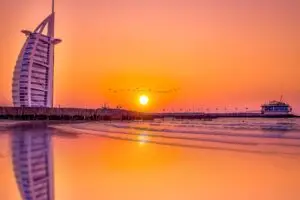Dubai was established today, June 9, 187 years ago, in 1833. Later on, on December 2, 1971, the six emirates declared their independence from Britain and the United Arab Emirates was born.
Since Dubai is one of the key jurisdictions for Benson Formations and means a lot to us, therefore, to celebrate this day, we have decided to prepare some interesting and useful information about this emirate before your travel to Dubai.
The Emirate of Dubai is one of the seven emirates of the United Arab Emirates. The Emirate of Dubai has the largest population of 3,33 million, in contrast to the second largest population of the Emirate of Abu Dhabi (UAE capital) of 1,45 million. It is Dubai and Abu Dhabi that have a special right of veto when dealing with critical issues. The current ruler of the Dubai Emirate is Sheikh Mohammed bin Rashid Al Maktoum, who also serves as the Prime Minister and Vice President of the United Arab Emirates.
Surprisingly, the economy of Dubai is not based on the oil industry, but mainly other sectors such as trade, manufacturing, tourism and services contribute to its budget. Moreover, Dubai is attracting worldwide attention by its large and high-profile real estate projects such as The Palm, Burj-Al-Arab hotel or Dubailand. Nevertheless, Dubai still produces approx. 240,000 barrels of oil per day and oil and gas contribute approx. 6% to the Dubai GDP (whereas tourism approx. 12%).
Dubai has hot and dry climatic conditions with some months exceeding an average temperature of 40°C. Precipitation occurs more sporadically only around 150mm per year usually in January, February and March. Humidity in the winter months is 60%.
The working week is generally Sunday to Thursday. However, some businesses are open six days a week, closing on Fridays, and some even seven days a week (e.g. retail). Usual business hours are from 08:00 to 13:00, resuming after the temperatures have begun to cool from 16:00 and continuing until 19:00.
The laws and culture of Dubai and the UAE are directly linked with Islamic tradition. And there’s no better time to experience it than during Ramadan, the Islamic holy month. Followers fast from dawn to dusk, and when the sun sets Muslims enjoy an Iftar meal with friends and family. You can join in the many Iftar buffets across the city and take part in local traditions. Ramadan is based on the lunar calendar, so the dates move forward every year.
Traditional Emirati art is based on Arabic calligraphy, which uses Arabic script to create artistic patterns. Arabesque and girih Islamic geometric patterns are also a big part of traditional art. You will find galleries, studios, performances, furniture shops, pop-up shops and cafes in these creative hubs.
The official legal alcohol limit for drivers in Dubai is zero—there’s no leeway here, so ensure you’re completely sober before getting behind the wheel. The police must be called to all car accidents, including single vehicle incidents.
Dubai itself has only 15 kilometres of beach. However, after the completion of the island complexes such us the Palm and The World, it has extended up to 1,500 km. The biggest leisure center project is Dubailand – a world of entertainment in the desert, consisting of ski slopes, a racing motor circuit, an eco-park and the largest shopping center in the world. Probably the most characteristic symbol of today’s Dubai is the luxurious 321-meter-high seven-star hotel Burj al-Arab (“Tower of the Arabs“), built in 1999, in the shape of a sailboat. Its interior is full of marble and gold.
As part of the United Arab Emirates, Dubai allows some travellers, who meet eligibility requirements, to obtain a free visa on arrival. The visa is issued at the airport and is valid for 30 days. Extensions are available through the airport immigration officer or the local immigration office in Dubai. Extensions are not guaranteed and you might be charged a fee.
Offensive language or hand gestures
Many of Dubai’s laws and customs are rooted in showing respect for one another. It is, therefore, an offense to use rude language or aggressive hand gestures, including while driving. Feeling frustrated that someone just cut you off on the road? A tool of the horn is about as far as you can go here.
Social Media, Slander and Photography
In fact, Dubai Emirate has very strict laws regarding all forms of social behavior, and this extends to social media. It is illegal to take someone’s photo without their consent, so be sure you’re not featuring any other people in your Instagram post. It’s against the law to make defamatory statements or offensive comments about people and organizations in the UAE, so mind your language on social media posts—including review sites.
In general, hospitality is central to everyday Emirati culture and sipping Arabic coffee, or gahwa, is part of the warm welcome. This aromatic coffee is made with cloves, cardamom, cumin and saffron, and poured from a dallah pot into a small cup called a finjaan. Enjoy gahwa with dates while relaxing in the majlis, a comfortable meeting space traditionally used to host guests and catch up with friends.
Dubai is rightly proud of what it has achieved since 1833 it has been an amazing journey from a small fishing and pearl town by the sea to one of the most renowned cities with global significance nowadays. And the journey continues. We wish you all the best Dubai.







